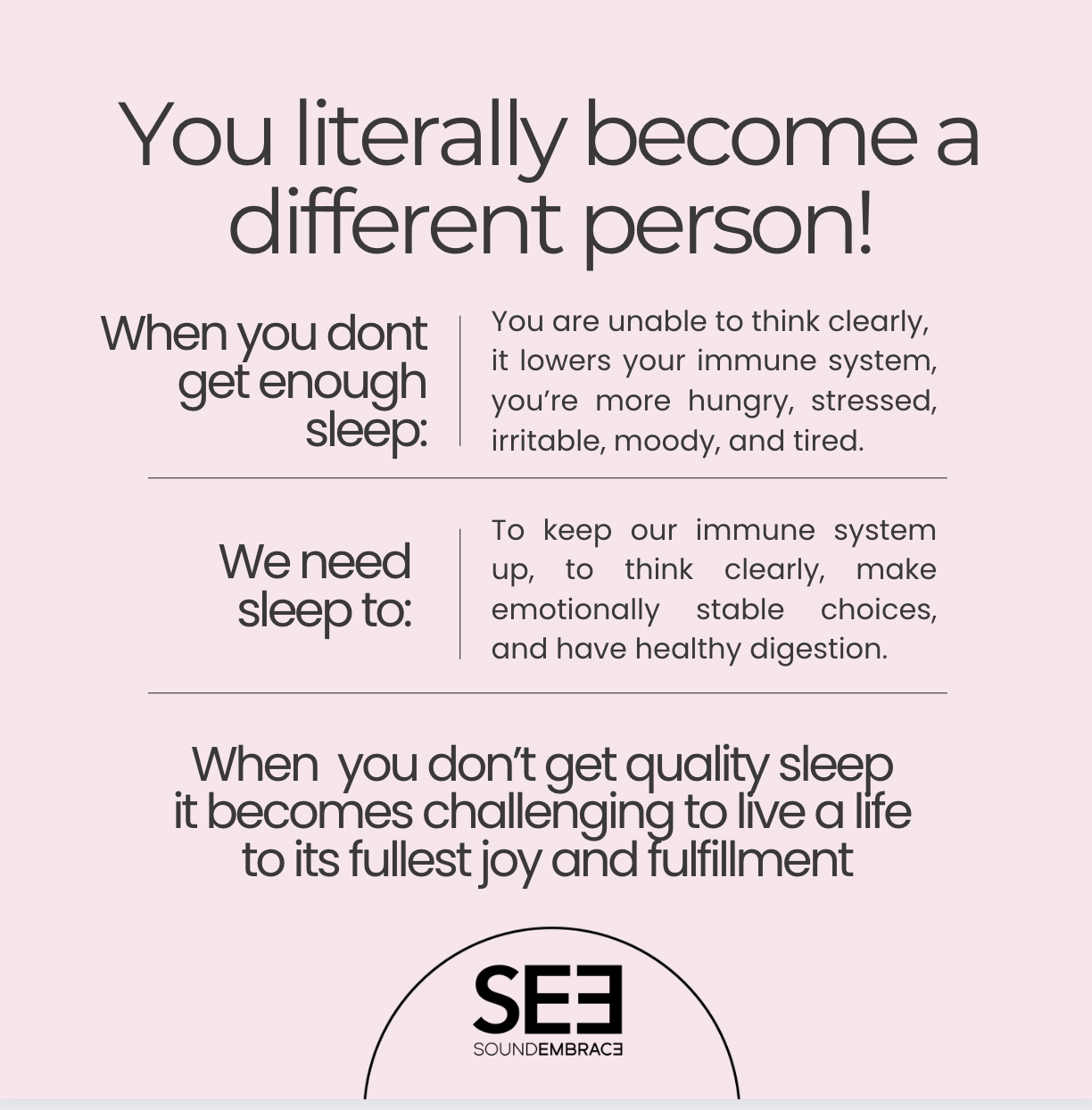Your Moment to Step In: Final Call for Sound Healing Certification
This is it.
In a world that feels chaotic, unpredictable, and often overwhelming, it’s easy to wait. To wait for the “right” time. To wait for things to settle down. To wait for the world to feel more certain.
But leaders don’t wait. Healers don’t wait. Those who create impact step in now.
The Sound Healing Certification Program is your opportunity to do just that—to take action in a time when people desperately need healing, connection, and tools to navigate their lives with clarity and strength.
Sound healing is not a luxury; it’s a necessity. As we face an impending new health crisis, political uncertainty, and the emotional toll of everyday life, we need holistic, non-invasive ways to support our well-being. This is your chance to provide that support, to step into leadership, and to make a meaningful difference.
This is your time to:
Claim your sovereignty by investing in yourself and your future.
Bring hope to your community through proven, transformative sound healing techniques.
Gain the confidence and skills to start or expand your practice with ongoing mentorship and support.
Take action and create your own opportunities, rather than waiting for permission.
With only 3 spots left and registration closing tonight, this is your moment to say yes to your calling. Don’t let this pass you by.
[Reserve Your Spot Here]
You don’t need permission to follow your passion. You don’t need things to be “perfect” to start. What you need is the courage to take the next step.
You’ve felt the pull. You’ve imagined what’s possible. Now is the time to act.
Join us before it’s too late.
With gratitude and excitement for your journey,
Danielle
Stepping Into Leadership: The Power of Sound Healing in Uncertain Times
Leadership isn’t just a title; it’s a commitment. A commitment to growth, to service, and to stepping into the unknown with courage and resilience. In today’s world—facing political uncertainty, health crises, and a collective yearning for change—leaders are not just needed, they are required. And leadership doesn’t only mean leading others; it means leading yourself first.
True leadership is about:
Taking ownership of your life and choices, standing firm in your values even when the world feels unstable.
Empowering your community with tools that provide relief, resilience, and well-being in the face of chaos.
Embracing innovation, blending ancient wisdom with modern science to bring holistic healing solutions into everyday life.
Leading with heart and purpose, choosing to rise above fear and uncertainty to create meaningful impact.
Sound healing is more than a wellness practice; it’s a leadership pathway. As a sound healing practitioner, you become a beacon of hope and transformation, offering your clients and community a non-invasive, accessible, and deeply restorative solution to the stress and overwhelm of modern life.
Great leaders understand the power of equipping themselves with the right tools and knowledge. Our Sound Healing Certification Program is designed to empower you with everything you need to step into your role as a facilitator of healing and a leader in wellness. You’ll gain:
A deep understanding of sound’s impact on the body, mind, and spirit
Hands-on experience and mentorship to build confidence in your abilities
Business strategies to position yourself as a credible leader in the wellness space
A community of like-minded changemakers who support and uplift one another
With so much happening in the world—**from health uncertainties to economic instability—**this is NOT the time to wait. It’s the time to rise. It’s the time to lead.
Are you ready to step up?
Registration closes this Friday, and we have just 3 spots left. Claim your seat now: [Insert Registration Link]
Now is the time to embody leadership—in your life, your health, and your community. Sound healing isn’t just an addition to your skillset; it’s a call to action. The world needs more leaders like you.
Step in. Stand tall. Lead with sound.
With determination and gratitude,
Danielle
Bridging Science & Spirit: The Power of Sound Healing in Today's World
In a time where our world feels increasingly unstable—political unrest, health crises like the bird flu, and rising emotional and physical stress— it’s crucial to seek solutions that are both scientifically grounded and spiritually enriching.
Sound healing is not just an ancient practice; it’s science. It’s the bridge between the seen and unseen, a legitimate and evidence-backed tool that complements traditional medicine and wellness practices. In fact, research has shown that sound frequencies can:
Reduce stress and anxiety by shifting brainwave states and regulating the nervous system
Alleviate chronic pain and support healing through vibrational resonance
Improve sleep and emotional well-being, offering relief in ways that pharmaceuticals often cannot
Enhance focus and cognitive function, providing a holistic approach to mental health
From hospitals to holistic clinics, forward-thinking practitioners are incorporating sound healing into their treatment plans, recognizing that wellness is multi-dimensional—encompassing body, mind, and spirit. This is the future of healthcare.
In our Sound Healing Certification Program, we provide you with the scientific foundations, hands-on techniques, and business strategies to legitimately integrate sound healing into your current practice or start a brand-new career in wellness.
Whether you're a healthcare provider looking to expand your skillset or an individual passionate about making a real difference in your community, sound healing offers a practical, transformative solution to the chaos we face today.
This is your time to step forward. The world needs healers and leaders who are grounded in both ancient wisdom and modern science—and with just 3 spots left, your opportunity is here.
Registration closes Friday. Take action now: [Insert Registration Link]
Sound healing is more than just a trend; it’s a necessary tool for navigating the challenges of our modern world. Let’s build the bridge between science and spirit—together.
With gratitude and belief,
Danielle
Tradition Rooted in Humanity: Healing in Times of Uncertainty
In a world of political turmoil, health crises, and the constant fight for personal sovereignty, it’s easy to feel overwhelmed, disconnected, and powerless. But throughout history, in times of uncertainty, sound has been a constant force of healing, strength, and transformation.
From the chants of the Hopi to the gongs of the Polynesian gods, sound has always served as a sacred bridge—connecting us to our deeper selves, our communities, and the Divine. Now, more than ever, we must reclaim these ancient practices to restore balance, clarity, and resilience in our lives and the lives of those around us.
The SoundEmbrace Sound Healing Certification Program is your opportunity to step into this lineage of healers, leaders, and changemakers. By learning how to harness the power of sound, you’ll gain the tools to:
Support your community through times of stress, grief, and uncertainty
Provide non-invasive, accessible wellness solutions to combat emotional and physical overwhelm
Take control of your own well-being, reclaiming your personal power and sovereignty in a chaotic world
Fast-track your certification to start making an impact—and generating income—sooner
Sound healing isn’t just about relaxation; it’s about resistance and resilience. It’s about creating space for healing when the world feels chaotic. It’s about taking action, showing up for yourself and your community, and embracing the power of sound as a tool for change, empowerment, and hope.
With only 3 spots left and registration closing this Friday, this is your time to rise. Don’t wait—step into your calling today.
Sign up now.
3 Spots Left – The Time for Sound Healing is NOW
As we count down to the closing of registration for the SoundEmbrace Sound Healing Certification Program, I want to take a moment to acknowledge the world we’re living in right now. Political uncertainty, global challenges, and personal pressures can leave us feeling overwhelmed, but now is not the time to step back—it’s the time to take strategic rest and rise.
Registration closes this Friday, January 31, and only 3 spaces remain.
Now, more than ever, our communities need leaders who can provide meaningful, non-invasive, and accessible wellness solutions. Sound Healing isn’t just about playing beautiful tones—it's about stepping into a transformative role where you can support others in stress reduction, pain relief, and navigating the difficult emotions of uncertainty and grief.
This program is designed to equip you with the tools, knowledge, and mentorship to confidently step into this growing field. And the best part? There are accelerated pathways available so you can begin your practice sooner—earning back your investment while making a meaningful impact.
But let’s be clear: this program isn’t for those looking to “just get by.” It’s for those who are serious about serving their communities, becoming skilled facilitators, and embracing the full potential of Sound Healing as a holistic practice.
If you feel called to step into this powerful work, I encourage you to take action now. Your journey starts with a single decision, but the impact will be far-reaching.
Secure your spot before it’s too late
Let’s rise together—sound by sound, moment by moment.
A Revolution in Wellness in 2025
The incessant pressure of political uncertainty, diminishing sovereignty, climate change, rising healthcare costs, and the emotional toll of inaccessible care has led us into a state of collective overwhelm.
We are experiencing an activation of our sympathetic nervous system. An arousal of our heartbeat and breathing. We are searching for something to hold onto, a way to recalibrate and align ourselves with a sense of groundedness, safety, and clarity as to what will happen, and the ripple affect it will have in our lives and our neighbors lives.
In the midst of this chaos, our primal instincts turn on and up! Anxiety begins its slow drip into our nervous system and we unconsciously go into mini states of panic.
Deep breath, my friends.
This is a moment to pause.
Bring your consciousness back to the present.
Pause.
We have faced uncertain times together before. The pandemic helped us become more insightful and resilient. It helped us to see the importance of community and slowing down. It helped us to see more clearly how the media spins information. It helped us become more resourceful and find joy in what we have. It helped us see the importance of lifestyle changes to keep our immune systems up and healthy!
Now... apply what you have learned.
The greatest defense is to have a regulated nervous system. It prioritizes stability, and protection for your health, elevating focus, clarity, and boosting your immune system. This sets you up for success in having a powerful offense! Making strategic, empowered, aligned plans of action, not reaction, when it comes to outside influences.
Sound Healing is not just a practice. It’s a revolution in wellness, an antidote to the demands of a chaotic climate.
Sound Healing is a powerful, non-invasive, and deeply transformative tool to reclaim our personal power, sovereignty, and leadership. Through sound, we can reclaim our clarity and power, stepping into a more balanced, centered, and purposeful way of living.
Join me on this revolutionary journey.
Whether you sign up for the SoundEmbrace Sound Healing Certification Program, come to an in person session, or sign up for the free SoundEmbrace Membership, you have to make a decision...
Will you continue allow to yourself to be a victim to the environment and circumstances around you, or will you stand up and do what you need to do in order to regulate your nervous system and make more grounded, empowered decisions in creating a life and world you want to wake up in?
Its a revolutionary act to have a regulated nervous system.
Imagine helping others in that revolution?
Become a Certified Sound Practitioner.
Be the change you wish to see.
BIG HIGS,
Danielle
Not Sleeping : You literally become a different person!
Sleep is a fundamental biological process that affects nearly every aspect of our lives. Here are some key facts about sleep and its impact on various areas of life:
Physical Health:
Restoration and Repair: During sleep, the body undergoes processes that repair tissues, build bone and muscle, and strengthen the immune system.
Metabolism: Lack of sleep can disrupt the balance of key hormones that control appetite, leading to weight gain and obesity.
Heart Health: Chronic sleep deprivation is linked to an increased risk of heart disease, high blood pressure, and stroke.
Cognitive Function:
Memory Consolidation: Sleep plays a crucial role in consolidating memories and learning new information.
Attention and Concentration: Inadequate sleep impairs cognitive functions such as attention, concentration, and decision-making.
Problem-Solving: Well-rested individuals tend to have better problem-solving abilities compared to those who are sleep-deprived.
Emotional Well-being:
Mood Regulation: Lack of sleep can lead to irritability, mood swings, and an increased risk of developing mood disorders like depression and anxiety.
Stress Management: Adequate sleep helps the body regulate stress hormones, improving the ability to cope with challenges.
Productivity and Performance:
Workplace Performance: Sleep deprivation can impair productivity, focus, and creativity, leading to reduced effectiveness at work or in academic settings.
Safety and Alertness: Fatigue-related accidents and errors are a significant concern in industries that require high levels of alertness, such as transportation and healthcare.
Immune Function:
Resilience to Illness: Adequate sleep strengthens the immune system, making the body more resistant to infections and illnesses.
Aging and Longevity:
Cellular Repair: Sleep is essential for cellular repair, which may play a role in aging and longevity.
Cognitive Decline: Chronic sleep problems are associated with a higher risk of cognitive decline and neurodegenerative diseases.
Social and Interpersonal Relationships:
Communication Skills: Lack of sleep can impair social interactions, leading to misunderstandings and strained relationships.
Empathy and Emotional Intelligence: Adequate sleep is linked to improved emotional intelligence and empathy.
Mental Health:
Psychological Resilience: Quality sleep supports mental resilience, helping individuals better cope with stressors and challenges.
Psychiatric Disorders: Sleep disturbances are common in various mental health disorders, and improving sleep quality can be a crucial part of treatment.
Hormonal Balance:
Endocrine System: Sleep affects the release of various hormones, including those that regulate growth, stress response, and reproductive function.
Overall Quality of Life:
General Well-being: Adequate, restful sleep is essential for a sense of overall well-being, vitality, and life satisfaction.
Sleep is not just a period of inactivity; it's a vital process that influences physical health, cognitive function, emotional well-being, productivity, and much more. Prioritizing good sleep hygiene and getting sufficient rest is crucial for optimal functioning in all areas of life.
With more FREE sound healing sessions on YouTube, or the added benefits of The SoundEmbrace Membership, we can work together to reduce anxiety, depression, focus challenges, and insomnia through strategic sound healing sessions when you need them.
Sleep well. 💤
Why it is important to take Sound Healing Certification?
Taking an official Sound Healing certification course can be important for several reasons:
Knowledge and Skill Development: A certified course provides structured learning and comprehensive knowledge about the theory, techniques, and practices of Sound Healing. It equips you with a deeper understanding of the subject, including the scientific principles, different sound healing modalities, and their applications. You'll learn about the effects of sound on the human body, mind, and emotions, as well as how to work with various instruments and tools effectively.
Credibility and Professionalism: Obtaining a certification adds credibility to your skills and knowledge. It demonstrates that you have undergone formal training, met certain standards, and are committed to maintaining professional ethics. Clients and employers are more likely to trust and choose practitioners who have completed certification courses.
Client Safety and Well-being: Sound Healing involves working with individuals who may be dealing with physical or emotional challenges. By undergoing a certified course, you learn about safety protocols, ethical considerations, and appropriate practices to ensure the well-being of your clients. Understanding contraindications, recognizing potential risks, and knowing how to create a safe and supportive environment are crucial aspects covered in a certification program.
Networking and Community: Official certification courses often provide opportunities to connect with like-minded individuals, practitioners, and experts in the field. Building a network within the Sound Healing community can be invaluable for ongoing support, collaboration, and mentorship. It allows you to stay updated on new research, techniques, and advancements in the field.
Legal and Regulatory Compliance: Depending on your jurisdiction, there may be legal or regulatory requirements to practice Sound Healing professionally. Completing our certification course supports you in finding the necessary standards to operate within the legal framework. It helps protect both you and your clients by ensuring you adhere to professional standards and guidelines.
Personal Growth and Development: Beyond the practical aspects, a certification course can facilitate personal growth and development. It provides a structured learning environment where you can explore your own relationship with sound, develop your intuitive abilities, and deepen your understanding of the mind-body connection. It can be a transformative journey that enhances your own well-being and enables you to assist others more effectively.
While certification is not a legal requirement in all places, it can significantly contribute to your professional growth, credibility, and the ability to serve others responsibly and effectively in the field of Sound Healing.
What a great turn out for last night’s session
What a great turn out for last night’s session in Atlanta called Emerge.
It was a mix of journaling, yoga, breathwork, and sound healing. What a beautiful way to bring in the new energy of Spring!
You are your own healer. I am simply a guide along the journey. You are powerful beyond measure. And you are worthy of your deepest hearts desires.
So many great experiences coming up in Georgia and Alabama for April! I can’t wait to see you, hug you, and remind you of the depth of your own being!
Click soundembrace.com for more information, and to sign up!
What a great turn out for last night’s session
What a great turn out for last night’s session in Atlanta called Emerge. It was a mix of journaling, yoga, breathwork, and sound healing. What a beautiful way to bring in the new energy of Spring!
You are your own healer. I am simply a guide along the journey. You are powerful beyond measure. And you are worthy of your deepest hearts desires.
So many great experiences coming up in Georgia and Alabama for April! Check the link below. I can’t wait to see you, hug you, and remind you of the depth of your own being!
Spring is a time of awakening
Spring is a time of awakening, and rebirth. The dark months are now over and we're moving into the warmth of the light.
Nature is waking up + being reborn, and this is happening within you as well!
As we begin to shake off winter and emerge from our cozy dens, we discover that the landscape is beginning to change. Often, what we see happening with nature and the seasons, we see within ourselves. As we step into the light, we are faced with the truth of visual change in front us, as well as the change needed within to adapt and grow to support the life we want moving forward.
Let’s bring clarity to what you are yearning to create for yourself.
This Wednesday, March 22 in Atlanta, @sarah.brackmann and I will be leading a session called Emerge. We will begin with journaling prompts connecting us deeper to the meaning and intention of the session. You will be guided into gentle movement which will then evolve into a comfortable position where you will experience a deep and restorative breath work practice. To integrate and soothe the mind body we will evolve into an etheric sound bath experience.
Our intention is to awaken your spirit to the energy of spring and EMERGE grounded and empowered to step forward into this new season.
Bring a journal, pen, blanket, pillow, and anything else that will support you in feeling cozy. (This session has limited space.)
So many great sessions coming up in Georgia + Alabama! (Link in bio!)
It brings me so much joy to walk with you on your journey!
https://www.soundembrace.com/.../emerge-a-journey-through...
Today is the day, Alabama
Today is the day, Alabama.
@romarin_corbeaux is hosting @aftons.bodywork and I to share a pretty special experience with you.
I think Afton shred it best:
A funny thing just occurred to me as I changed out my old phone case and screen protector I've used and abused this past year.... it felt like a brand, new. phone! I've been walking around feeling micro-cuts on my thumb for a while now, and that old phone case was SO worn out. All it took to feel new again was 25 dollars and 30 minutes of my time... why didn't I do that sooner!?
How many of us get used to our small, seemingly insignificant pains and anxieties until they build and build causing "death by a thousand cuts" !?
We minimize our "small" pain just hoping for it to magically go away, or not wanting to bother because it doesn't feel big enough. Meanwhile, we could have made small changes alongside the pain instead of suffering for so long.
There are opportunities around us all the time to awaken our intuition, and listen to that gentle voice in our heads urging us to counteract and heal those pains!
@sound_embrace and I are providing one of those opportunities this afternoon. We are hosting an intentional, healing space at Romarin et Corbeaux.
There will be a journaling prompt inspired by a tarot card that embodies the new beginnings this Spring Equinox energy is calling in. Following will be a guided meditation accompanied by cranial massage, to help keep your mind connected to these new possibilities. To bring everything to culmination, you will be led deeper into an integrative Sound Bath experience.
Come make a small change with us, and help yourself lessen those little (or big) pains.
P.S. There are still a few spaces open to sign up! Click SoundEmbrace.com to sign up!
Self-Love as our Foundation
Self-Love as our Foundation
We are coming upon a special session I am collaborating on with @aftons.bodywork over at @romarin_corbeaux in Oxford AL. As I shift gears to lean into our topic and intention of Awakening, I am reminded of the astrological aspects we are about to swim in for the next few weeks.
If you are new to the astrology conversation, my invitation to you is that you take what serves and leave what doesn't. I think of astrology as another tool for curiosity of self. Kind if like a Myers Briggs sort of thing, only using math of the planets and stars! MOVING ON! “Venus’ transit in Taurus brings the spotlight on our relationship with ourselves, on how we nurture ourselves, how we love ourselves, how we take care of ourselves. It reminds us that to love another we have to, first and foremost, be committed to loving ourselves and meeting our needs. This transit inspires us to pay attention to our attraction patterns and how they reflect what is going on within ourselves.”
This is an opportunity to begin witnessing patterns in our relationships which may bring us face to face with underlying feelings of worthlessness, of not deserving what we truly desire, scarcity patterns, and blocks that limit our receptivity.
“During the upcoming weeks, we may realize what kind of work we have to do on ourselves in order to create the relationships we aspire to have, what changes need to be made in how we relate to ourselves, and in how we relate to others as a consequence. This transit is an opportunity to choose self-love as the foundation for all our decisions, particularly in terms of relationships, and commit to loving ourselves as we wish to be loved by another.”
Begin to ask yourself the hard questions. This is the only way we may begin to Awaken to the truth of who we are, who we want to become, and taking personal ownership of the role we play in our lives. Move out of victimhood, codependency, and release the crutches holding you back from your own empowerment.
You are worthy.
You are enough.
I know you can do this!
Post inspired by @moonomens Thank you, for your work.
As one Journey comes to a close another one begins
As one Journey comes to a close another one begins.
Birthdays are sort of like that for me. One chapter gently coming to a conclusion, while the next is ready to have life breathed into it.
As I take some time to reflect on the past year I see that there were so many endings and beginnings, beginnings and endings…
40 was chaotic, disruptive, and beautiful.
They say, “Your new life will cost you your old one.” Well, I guess thats true. 40 stripped me down so I had the room to grow. I’ve allowed the old versions of myself finally lay to rest, and it feels good to water this new foundation.
This past Sunday, March 12, I walked into 41. It was a little shaky, but I’ve swam in the oceans of the unknown before.
Let’s do this!
@wolfuntamedphoto for @ddytravels @ddyatl
Thinking about all the ways in which we love
Thinking about all the ways in which we love, and all the ways we miss receiving it because we haven’t done the work to cultivate it within ourselves to be able to recognize it from others.
Click soundembrace.com to sign up for upcoming sound bath sessions! I look forward to seeing you very soon.
No mask is thick enough to hide everything
No mask is thick enough to hide everything.
Many times it’s the things we feel shame around that we want to hide. This hiding creates interest on the story we tell ourself about it, and can then manifest in different ways.
It can affect our health.
It can affect our relationships.
It can affect our self worth, decision making, and so much more!
Come to a sound bath with me and begin to lovingly chop away at the accrued interest from shame, and build the courage to begin stepping forward free from its weight.
Life will begin to look and feel a lot different!
COMING UP!
Monday, Feb 27 / Emory University Students Relax in Sound Emory University] Emory Recreation & Wellness] @rsphengage
Wednesday, March 1 // Sound Journey in Atlanta at F U L L C I R C L E Studio]
Tuesday, March 7 // Instagram Live chat w/ + mini Sound Bath
Wednesday, March 15 // Rest + Restore Virtual Sound Bath // Pay what you can
Sunday, March 19 // Awakening - Spring equinox session in Oxford, AL at @romarin_corbeaux . Collab w/ @aftons.bodywork
Wednesday, March 22 // Emerge - Journey through breath + sound in Atlanta at F U L L C I R C L E Studio] Collab with @sarah.brackmann
Friday, March 24 // Emory University Students - Relax in Sound Emory University] Emory Recreation & Wellness] @rsphengage
Click soundembrace.com to sign up!
Even the most beautiful experiences come and go
Even the most beautiful experiences come and go…
With the weekend drawing to a close and awareness of my to do list creeping in , I remind myself to “be here in the now.”
Everything is working in my favor…
abundance is all around me…
and love fills my being.
Please + tag when you share so I can show you some love and gratitude.
You don’t know what you don’t know! Fast track your progress by signing up for the SoundEmbrace Sound Healing Certification Program. Get the education + experience you need for a leg up in your sound healing goals while saving time + money!
In person Sound Bath Journey Feb 8 in Atlanta at @fullcircleatl
Click soundembrace.com for more information.
Dinner and Blanc!
Dinner and Blanc!
It was a whirlwind trip out to Albany, GA to support a friend doing a big thing for the community.
The Dîner en Blanc concept began in Paris in 1988 when François Pasquier invited a group of friends to an elegant outdoor dinner at the Bois de Boulogne, asking them to dress in white so they could find each other. The event's presence has grown to over 85 cities, with almost 17,000 gathering for the 30th-anniversary event in Paris.
May we always find each other as friends and move through this world with love!
@inherentsound so proud of you and and inspired! Thank you for an awesome time!
And my hot date Adam for spinning me around on the dance floor! Glad we got to experience this together.
So much coming up!
Wednesday, Oct 12 Virtual Sound Bath to ground before the Holidays hit!
And then we are turning up the dial of intensity for this months in person sound bath sessions with Sound Journey! You’re ready for it!
Sunday, Oct 16 Sound Journey in Auburn, AL at @beyogaauburn
Sunday, Oct 23 Sound Journey in Atlanta, GA at @fullcircleatl
Tuesday, Oct 25 Sound Journey in Oxford, AL at @onyxandopalshop
Click soundembrace.com/calendar tosign up now. Spaces are limited.
We are inching into mid October!
We are inching into mid October! Can you even believe it?!?
Feels like a good time for a virtual live sound meditation to check in before all the Holidays hit!
Let’s come together for a guided meditation sound bath session to check in with your inner knowing, and find some grounding before we hit this whirlwind called the Holidays!
Link in bio or soundembrace.com/calendar tosign up for this virtual sound bath session on Wednesday, October 12.
Sound healing experiences
Sound healing experiences.
There are many different types of experiences guests can have during a session. Sometimes people see colors, or shapes. Sometimes guest have a “knowing” sense about something. Some see animals, flowers, and other visuals. While others may feel tingling sensations, or body temperature shifts. And others… well, they may just fall asleep!
While experiences range from the physical, emotional, mental, and spiritual your experience will be unique to you and what you’re currently holding in your body.
It’s fascinating. And I am STOKED to support you in connecting the dots on what your experiences are about.
See you at a sound bath soon!
Sunday Oct 16 in Auburn, AL at @beyogaauburn
Sunday Oct 24 in Atlanta, GA at @fullcircleatl





































